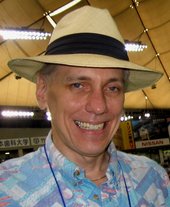
THE HOT CORNER: Fukuchi finally steals spotlight

THE HOT CORNER: Fukuchi finally steals spotlight
by Jim Allen (Feb 5, 2009)
When Kazuki Fukuchi comes to the plate at Jingu Stadium, the sound system blasts out the Doobie Brothers' "Long Train Runnin'." For a player whose career was rescued in his 13th pro season, it has been a long ride.
The Hiroshima Carp traded him in March after a total of 367 plate appearances over 12 seasons with the club, because the organization considered him an expendable pinch-runner.
"It was not a matter of the quality of the player we could get. He [Fukuchi] just wasn't going to play for us," manager Marty Brown said by telephone on Monday of the trade he made just prior to his first season as Carp skipper. "[Tomonori] Maeda and [Koichi] Ogata were there and Fukuchi was way behind them on the depth chart."
Since being disposed of on March 24, 2006, the 33-year-old Fukuchi has gone to the plate 1,221 times. He hit .320 last season, led the Central League with 42 steals and was named to Japan's provisional roster for the World Baseball Classic.
"He deserves it. He's made the most of his chances," said Brown, who said he was forced to depend heavily on staff reports to evaluate the team's talent when he first arrived.
"He's a classy guy."
If Fukuchi weren't a class act, he might choose different walk-up music when the Carp are in town. Perhaps Joni Mitchell's "Big Yellow Taxi" would be appropriate: "Don't it always seem to go, that you don't know what you've got till it's gone...."
Brown said it was "disturbing" how badly the organization missed Fukuchi's talent. Disturbing yes, surprising no.
After all, this is the club that for several years would have paid somebody to take big slugger Shigenobu Shima off its hands.
Shima, who hit like crazy in the minors, foiled the club's policy of benign neglect by hitting so well that it had to use him. Getting the first real playing time of his career at the age of 28 in 2004, Shima essentially won the batting title in the first half of the season.
Of course, Shima didn't suddenly shift from being worthless to being a star. Nobody does that at the age of 28. He was good before, but the Carp were content to be ignorant.
The same thing with Fukuchi, who became a valuable asset for the Seibu Lions for two seasons and an even more valuable player for the Swallows last season.
A year ago, the Lions left Fukuchi unprotected when they signed free agent lefty Kazuhisa Ishii from Yakult a year ago. Lions skipper Hisanobu Watanabe was promoted from the farm to first-team skipper and knew the young guys he wanted to bring up. Fukuchi, then 32, didn't fit into Watanabe's plan of a making the Lions younger, and the Swallows stole the speedster from the Lions den.
It was an ironic twist for a player whose youthful promise was wasted for the want of a manager like Watanabe.
When Fukuchi turned pro out of high school as a fourth-round pick in 1993, he was the best high school shortstop in Saga Prefecture and a former middle school hurdles champion. Within a few years, he was the greatest base stealer in Western League history. When he led the league for the fourth straight time in 1998, his 52 steals set a WL record. Fukuchi's batting took a little longer to develop, but a year after hitting .306 in 1999, he became a fixture on the Hiroshima bench.
It's hard to say how good Fukuchi was at the ages of 24 and 25, because he rarely left the bench except to pinch-run and fill in at second and in the outfield.
His playing time was blocked by a player 3-1/2 years older with an eerily similar career as a switch-hitting second baseman-outfielder: Takuya Kimura. Both players were unwanted by their original clubs, and both have twice been exchanged for players who were not as good as they were.
Despite Swallows manager Shigeru Takada's focus on speed last season, 2008 was the year Fukuchi proved he could be more than just a speedy singles hitter. Slapping at the ball less but driving it, he came into his own and far surpassed Ishii's contribution to the Lions in 2008.
"I have been very lucky," he told The Hot Corner last week. "After the season was over I went out to dinner with Ishii.
"I thanked him for helping bring me to my new stadium."
To access the original work (if still available), please reference:
http://www.yomiuri.co.jp/dy/sports/20090205TDY20301.htm.
Back to the works of Jim Allen
This work is licensed under a Creative Commons License.
Some rights reserved.
